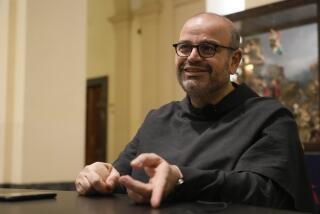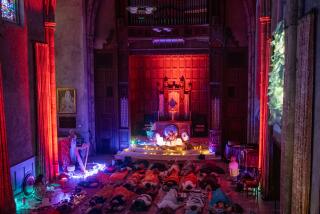Conference on Applications : Clergy Finds Its Own Uses for Computer Technology
When a member of his congregation died recently, the Rev. Barton T. Schaefer of the United Methodist Church in Williamsburg, Pa., was able to tap into his church computer and pull out a prepared obituary to send to the local newspaper, as well as information on the man’s will, safety deposit box and memorial wishes.
In Rochester, N.Y., when the Rev. Lowell Fewster sat down several months ago to prepare a sermon for Gates Presbyterian Church, he pulled several ideas from his “Sermon Idea” computer disc and composed the homily on his word processor.
Mental Health
For six years, the Rev. Curtis S. Ackley of the United Church of Christ in Linfield, Pa., met weekly with other pastors from his area and a psychologist who specializes in community mental health. But in an effort to widen the exchange of views, Ackley now meets via a telecommunications network that allows pastors far from Linfield to join the conferences by using their home or church computers.
These clergymen, and about 350 others who gathered in Los Angeles earlier this month, are evidence that the nation’s religious community--no less enthusiastically than the general population--is finding its own particular uses for computer technology.
The church use of personal computers ranges from Bible games during Sunday school to swift communication among parishes and their national headquarters during a crisis.
One seminary professor described the computer revolution in organized religion comparable to the advent of the printed Bible four centuries ago.
No Geographical Limits
“With the computer, you can have all kinds of pastoral relationships where geography doesn’t place any limits,” said David Lochhead, professor at Vancouver School of Theology at the University of British Columbia. “You can also do a lot of immediate conferencing with other people with the same interests or needs, without any reference to time.”
The clergymen and church leaders met at the Hyatt Airport Hotel for a three-day conference on computer applications for the ministry, which included workshops on how computers work, how to acquire and use a computer system, what software to buy and how to tap into various church-sponsored telecommunication networks that stretch from coast to coast.
The conference was sponsored by the Joint Strategy and Action Committee, a New York-based nonprofit corporation that works to foster cooperation between dozens of denominations and religious organizations. Executive Director John C. DeBoer said the know-how gleaned from the conference, the first held by the group, will help churches across the country save money by learning about software programs and systems that other congregations have developed.
Imaginative Uses
As part of the conference, the committee gave out awards for the most imaginative use of computer systems in churches. Among the winners was the USA Presbyterian Synod of Southern California and Hawaii, which for the last two years has used computers to study demographic characteristics and family profiles in neighborhoods near their churches, including those in Los Angeles.
James I. Oliver, an official with the synod, told the conference that the governing bodies of the church have used the information to develop programs suited to the needs of the surrounding communities. For instance, officials can use demographic projections to determine where new ministries are needed. Oliver reported that the new programs have helped some churches reverse declining membership trends.
Not that computers in churches is a purely spiritual matter.
Manufacturers and distributors of computer software designed specifically for church purposes also were on hand, offering services and computer programs simple enough “to allow the last fat lady” in the church office to run the parish, as one salesman put it.
Catering to People
“People drop out of church a lot of times because they are not being cared for properly,” said Eugene A. Boivin of Computer Paradigm, a Los Angeles company that offers a software package for churches for $1,295. “With our software, you can keep track of everything, including what bugs people. For example, don’t bug him about money or he will stop giving to the church.”
Representatives from companies with catchy names such as Exodus Computing, Word of God Communication, ADAM Church Management System and Angel Systems came from as far as Florida and New York to spread the word about their new products.
While many congregations were reduced to mere numbers on computer screens during the conference, various participants dismissed concerns that the computerization of religion could dehumanize churches and make them less sensitive to the needs of congregations. If anything, they said, computers in the church will help bring people closer together.
“It is like a small-town party line that spans the globe,” said the Rev. Ken Neal, a pastor in Buffalo, N.Y. “The computer is neither a friend nor an enemy. It all depends on what we choose to make of it.”






